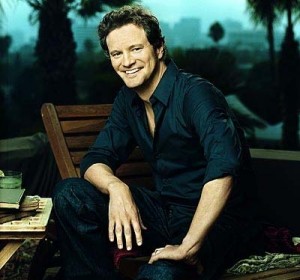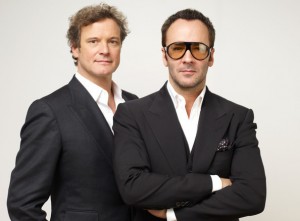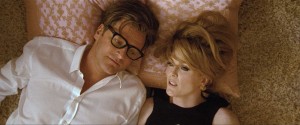 You sort of forget how long Colin Firth has been around. He is always the consummate actor, who brightens even the most banal of movies (we forgive him for What a Girl Wants). Most of us remember the performances he shines brightly in, such as titular character in Valmont, Mr. Darcy in the BBC’s Pride and Prejudice – and even Mark Darcy in the Bridget Jones’ Diaries.
You sort of forget how long Colin Firth has been around. He is always the consummate actor, who brightens even the most banal of movies (we forgive him for What a Girl Wants). Most of us remember the performances he shines brightly in, such as titular character in Valmont, Mr. Darcy in the BBC’s Pride and Prejudice – and even Mark Darcy in the Bridget Jones’ Diaries.
But every once in awhile, Firth is handed a plumb role he can really sink his teeth into. His turn as painter Johannes Vermeer in Girl with a Pearl Earring comes to mind – and now his work in A Single Man, fashion designer Tom Ford’s directorial debut. Based on a novel by Christopher Isherwood, the film focuses on one day in the life of a lonely gay college professor named George, who is struggling deeply with the sudden tragic death of his longtime lover – and Firth is finally and deservedly getting major Oscar buzz for his performance. Lucky me got to sit in on a press conference in which he talks about creating the character and how he treasures those quiet moments in film.
Step 1: Playing gay is just another way of expressing love
Colin Firth: “Whenever I embark on a project, it’s an opportunity for me to plunge into a particular world, a different perception. Learn maybe about a time and a place I didn’t know so much about. Love is love, so I don’t really feel there’s anything different to play because the partner happens to be male. The person I’m playing opposite is unlikely to be my lover anyway. It’s the job description. These emotions, you find them from somewhere, it’s the job. I think one of the things I appreciate most about [Christopher] Isherwood’s writing is that he doesn’t make the sexuality a salient feature. Sexual love was part of it but he was writing at a time where there were a lot of writers covering that up. His characters just happen to be gay. I don’t define myself by my sexuality either. And I think one of the things George isn’t struggling against is his sexuality. He is struggling with a lot of things, but he’s not struggling with being gay. I think he’s very happy with who he is in that respect … Because the character is not taking this on as an issue – it’s not his war with his sexuality or war against prejudice – I think the fact that he is comfortably open about the fact he is gay is definitely significant. Otherwise, why bother to feature it at all? It’s not irrelevant, I just think it’s about love and regret, which is absolutely, unashamedly and unassumingly THERE. Homosexuality simple as any other kind of sexuality.”
 Step 2: Trust your director, even if he’s a newbie
Step 2: Trust your director, even if he’s a newbie
Firth: “[Tom Ford] has a great gift. He’s never made a film before but it didn’t feel like working with a man who was a novice. At all. There were a couple of little pieces of film parlance he was unfamiliar with but it didn’t seem to matter, he’d just add them to his vocabulary and carried on. People treated him with the most enormous respect. There was such a strong sense he could be trusted with his taste and judgment that it actually relaxed people. A film set can be a very neurotic place. There can be rampant insecurity, people frightened of falling short, of failure, of miscommunication. There can be all kinds of complications. A good director smooths that all out and unites the set and creates a kind of unity of vision. He has that gift and I think he’s learned that over many years working in fashion.”
Step 3: Turn to the left, turn to the right …
Firth: “I think he may have just said to you now that fashion has something to say. It may not be a very popular thing to hear, even if it’s ‘I must make this woman wear this dress!’ or ‘This woman must feel like she has to wear this dress!’ He has to get that across in a few seconds on the runway. So he’s still using his creativity, still having to get a group of people to share a vision and still working towards having an impact. This time, it’s narrative drama, something he hasn’t done before but it’s clear to me it wasn’t a vanity project for him, not just a chance to show off his spring collection, you know. But yes, the clothes looked beautiful and wonderfully designed, but it was to the service of the story. The way George dresses so fastidiously, it’s really a sign of desperation. You get the feeling if he took off his cuff links, he’d fall apart. That he’s actually getting his body armor on, hanging on by his fingernails. It’s only his exterior world that he has any control over because inside, it’s all a mess. So to me, that was the purpose of the costumes, wasn’t just we’re going to have great silhouette because we are in a Tom Ford film. He didn’t give us a lot of verbal instruction; things were told to us through the senses.”
Step 4: Trust your leading man, even if he’s been doing this a long time
Tom Ford: “I think that I’ve always seen this character in Colin whenever I’ve seen him in anything, no matter what it was. Colin is such an amazing actor, and I’m not saying that he’s had small parts because he’s done some wonderful things in his life, but even in the smallest thing that you’ve ever seen Colin in there’s something that comes from inside him. He’s able to telegraph his thoughts or what his character is feeling, whether it’s real or not I don’t know. I don’t know enough about his process but he’s able to telegraph that with almost no movement to his face. There’s something about Colin that does seem very contained on the surface and yet inside you know there’s enormous emotion. That seemed absolutely perfect to me for George.
 Step 5: Appreciate the simplicity of the human face
Step 5: Appreciate the simplicity of the human face
Firth: “I love a scene without dialogue … when the material is incredibly coherent and eloquent, you feel inspire by it and you don’t want to go into a series of hugely demonstrative gestures, particularly when you believe in the power of just thinking things onto the screen. I love that kind of cinema. Bergman could spend a very long time on someone’s face, and to me the most interesting thing you can find in cinema is the human face. There’s a lot of beauty in cinema, but the most interesting thing to me is THAT. But one of the most dispiriting things is to see the possibilities of that, in a quiet scene and you’ve got an imaginatively creative director saying, ‘OK, we are going to start on the doorknob, and then we are going to pan across the floor and there will be a shot of the tape recorder light flashing and then we are going to get a close-up of your right eye. And I want a lot of orange in the shot and I want a silhouette of you, but way over there in the corner …’ That may look great, it’s just I feel it’s a waste for me. And that happens quite a bit. But then on the other hand, you might get a director who does put the camera on your face, but he decides he wants to interfere, control it, provoke it out of you: ‘Just think about the time your dog died when you were little.’ No, I was fine before the dog thing, thank you. I don’t know, Tom just let you do things. The script was clear to me. By the time we were there and saw the way he set things up, it was eloquent already. And so we were free, everyone in the film. Something about being very truthful and in the moment. If all of those things are happening, it’s has to be because of the director. [Tom] has cultivated an atmosphere where he’s not going to fuss around and just lets people connect with each other.”
Step 6: Give me the attention … no, wait, don’t … wait, OK, I’ll take it
Firth: “It’s confusing. [Actors] are confused and do want attention. It’s hard to judge an actor whose having his insane and insatiable need for attention fulfilled because he’s probably being at his best. It’s that Tom Waits line, ‘I don’t have a drinking problem except when I can’t get a drink.’ Check in with me when I’m not getting any attention. I don’t know, it is my day job, acting. And I do have a life. My wife is spectacularly good at keeping my feet on the ground. I have a home to go to at the end of the day, so all the rigors, disappointments, expectations, the ups and down, they come and go. Constantly. Disappointments don’t last unless you cling to them. And neither do expectations, really. Even if you get rewarded, you can’t cling to that moment.”


One thought on “How to Interview: Colin Firth”
Comments are closed.